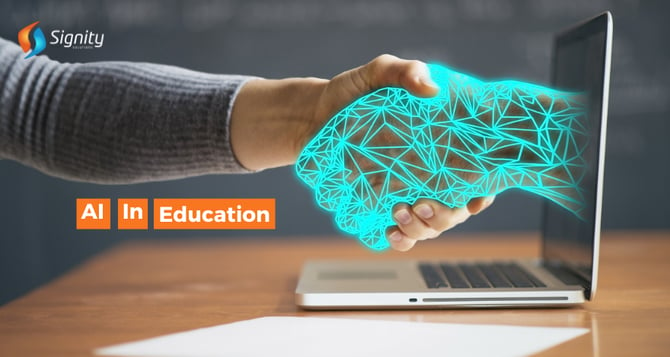13 Ways AI in Education is Shaping the Industry
AI is transforming the education industry, but how? Discover how this tech enables content creation and generation, interactive education, automation of administrative tasks, and AI-driven personalized experiences. Get all your answers related to AI and education with this blog.

The use cases of Artificial Intelligence can be seen in every industry. AI in education has helped provide personalized experiences to students, ensuring that each student gets the best solutions.
Not just this, AI education has also eliminated the global gap, helping students connect with quality learning resources and personalized education, regardless of their location. The technology has enabled students in underserved areas to access quality content and tutoring, bridging the global gap.
Though there are a few challenges of AI in education, like data equity frameworks, privacy breaches, and data security, partnering with an AI education development company can help you get the right solutions. This blog will take you through the best ways Artificial Intelligence can be used in the education sector and how institutions can benefit from it.
Key Takeaways
- Some of the major use cases of AI in education include personalized learning, content creation, student engagement, automated grading systems, and predictive analysis.
- AI education key benefits are improved classroom management, automation in education, enhanced curriculum, and professional development.
- A few challenges of AI in education are data security, ethical use, privacy breaches, and algorithmic biases.
- Integrating AI in the education industry enables educational institutions to gain the best growth opportunities by automating tasks and focusing on each student.
13 Ways How AI Education is Making the Industry Better
The use cases of Artificial Intelligence in the education industry are changing the industry for the better. From personalized learning to quick accessibility, smart content, and automated admin operations, we have listed the advantages of AI in education below:
.png?width=1920&height=1080&name=How%20AI%20Education%20is%20Making%20the%20Industry%20Better%20(1).png)
1. Personalized Learning
One of the biggest advantages of AI in education is the personalized learning for each student. The personalized training market is projected to grow to $48.7 billion by 2030. AI’s personal recommendations help students strengthen their weak areas and maximize potential by analyzing performance data and suggesting relevant resources.
2. AI-Powered Tutors and Assistants
The virtual AI tutors provide students with real-time assistance, helping answer queries, offering feedback on assignments, and guiding them through lessons. This 24/7 assistance provides students with continuous support, further freeing up teachers’ time by handling routine queries.
3. Smart Content Creation
Another use of AI in education is smart content creation. About 37% of educators use Artificial Intelligence to generate classroom materials like tests, assignments, and other interactive learning materials. It helps them save time and effort while delivering high-quality and dynamic materials.
4. Predictive Analytics for Student Success
AI in education helps institutions identify students who may be at risk of underperforming or dropping out by analyzing their academic and behavioral data. These insights, along with early warning systems, help schools design better retention programs tailored to student needs.
5. Enhanced Student Engagement
AI helps educators integrate gamified elements into learning, creating interactive experiences that engage students and make learning more enjoyable. Personalized challenges, rewards, and interactive quizzes keep students motivated and enhance their learning experience.
6. Automated Grading Systems
Artificial Intelligence in education reduces the time required for grading by up to 90%. AI streamlines the grading process by automatically assessing exams and assignments, helping educators focus on more complex tasks like providing personalized feedback. Hence, it accelerates feedback loops and provides students with timely insights into their progress.
7. Adaptive Learning Platforms
The AI platforms in the education industry adjust learning content in real-time based on the students’ progress. It also continuously assesses each student’s performance for adaptive learning and ensures personalized engagement, fostering a more effective learning environment where students can work at their own pace.
8. Immersive Learning with AI-Driven Stimulation
Artificial Intelligence in education is integrated with virtual and augmented reality (VR/AR) to create immersive learning environments. It provides students with hands-on, practical experience in fields like science, medicine, and engineering to boost understanding and retention. Hence, students can engage with complex scenarios and experiments.
9. Streamlined Administrative Tasks
The combination of AI and education helps reduce educators’ administrative burdens, like scheduling classes, managing student records, and processing applications. It further lowers errors and streamlines communication between students, parents, and educators, making processes smoother.
10. Virtual Classrooms for Better Learning
Did you know that studies have shown about 63% of students choose to study
online due to the flexibility of virtual learning? AI helps power virtual classrooms by enabling real-time interactions, tracking student engagement, and suggesting improvements to online teaching methods.
11. Language Translation and Localization
Another advantage of AI in education is that it breaks language barriers by translating educational materials into multiple languages. It creates more inclusive classrooms, where language is no longer a barrier to learning, and ensures culturally relevant examples are used through localization.
12. Special Needs and Accessibility Support
AI-driven tools like speech-to-text and text-to-speech assist students with disabilities to make learning more accessible to those with visual, hearing, or cognitive impairments. These technologies promote greater inclusivity in classrooms to level the field for students with different learning needs.
13. Data-Driven Insights for Curriculum Improvement
AI collects and analyzes vast amounts of data from classrooms to offer insights into what’s working and what isn’t, helping educators refine their curriculum and teaching strategies for better student outcomes. By identifying patterns and trends, AI helps schools create more effective curriculums.
Key Benefits of AI in Education for Schools and Education
AI in education offers various benefits to schools and education institutes, making the process easier and more efficient.
1. Professional Development of Teachers
AI provides tailored training and feedback for teachers, helping them improve their teaching techniques and stay updated with evolving educational trends. It can recommend specific resources or training modules based on individual teacher performance.
2. Improved Classroom Management
AI tools help teachers manage classrooms more effectively by analyzing student engagement and behavior patterns. These insights enable teachers to adjust their approach, optimize seating arrangements, and enhance group dynamics for better learning outcomes.
3. Predictive Enrollment and Resource Planning
AI forecasts student enrollment trends, enabling schools to plan resources like staffing, classroom spaces, and learning materials more efficiently. It ensures that schools are prepared for future growth or declines in student numbers.
4. AI-Enhanced Curriculum Design
AI can analyze global educational trends, student performance data, and industry demands to help schools create or update curricula. It ensures that educational content stays relevant and aligns with future skills requirements.
5. Automation in Education
AI education leads to the automation of administrative tasks, fairness in assessment, and interpretation in marketing, which leads to the improvement of the education system. AI has emerged as one of the most important tools in the education system.
Challenges of AI in Education
Implementing AI in the education industry comes with different challenges. From privacy concerns to location, accessibility, and ethical considerations, here is the list of the challenges.
1. Algorithmic Biases
AI systems can inherit biases from the data they're trained on, leading to unfair outcomes for certain student groups, such as inaccurate assessments or unequal access to opportunities.
2. Data Security
Educational institutions face challenges in securing large amounts of student data collected by AI systems, making them vulnerable to hacking and data breaches.
3. Privacy Breaches
With AI collecting sensitive student information, there's a growing risk of unauthorized access, raising concerns over how personal data is stored, shared, and used.
4. Ethical Use of AI
The ethical implications of AI in education are still evolving, with concerns over transparency, accountability, and the potential misuse of AI-driven decisions affecting student futures.
5. Bias and Discrimination
AI models can unintentionally reinforce existing inequalities, leading to biased outcomes that discriminate against students based on gender, race, or socioeconomic background.
Build the Best AI Education Tools With Our AI Experts
Whether you want AI in higher education institutions or for personalized learning, our educational technology will help you get the perfect solutions. With technology like machine learning, deep learning, natural language processing, and data analysis, we build high-quality tools to enhance the learning experience.
Get in touch with us for custom AI education solutions.
Frequently Asked Questions
Have a question in mind? We are here to answer. If you don’t see your question here, drop us a line at our contact page.
How is AI used for Education?
![]()
AI is used in education to personalize learning experiences, providing tailored support and feedback for both students and teachers, thereby enhancing teaching practices and improving educational outcomes.
Why is AI the Future of Education?
![]()
AI is considered the future of education because it promotes personalized learning at scale, allowing educators to address diverse student needs effectively while enhancing engagement through adaptive tools and systems.
How AI has a Positive Impact on Education?
![]()
AI positively impacts education by providing personalized adaptive learning solutions that cater to individual student needs, thereby improving learning outcomes and engagement.
How does AI Personalize Learning for Students?
![]()
AI personalizes learning by analyzing individual student data, such as learning styles and performance metrics, to tailor educational content and recommend resources that match their unique needs and pace.
How does AI Improve student Engagement?
![]()
AI enhances student engagement through interactive learning experiences, personalized feedback, and gamified learning environments that motivate students to participate actively in their education.



.png?width=344&height=101&name=Mask%20group%20(5).png)
















